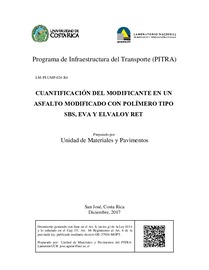CUANTIFICACIÓN DEL MODIFICANTE EN UN ASFALTO MODIFICADO CON POLÍMERO TIPO SBS, EVA Y EVALOY RET

View/
Date
2017-12Author
Salazar Delgado, Jorge
Aguiar Moya, José Pablo
Rodríguez Castro, Ellen
Loría Salazar, Luis Guillermo
Metadata
Show full item recordAbstract
El uso de ligantes asfálticos modificados con polímeros una alternativa muy poderosa al ligante convencional, ya que mejora notablemente su desempeño evitando problemas típicos durante su servicio y mejorando su resistencia a la fatiga, a la deformación permanente y reduce la susceptibilidad al daño por humedad.
El uso de ligante asfáltico modificado se ha convertido en un tema de gran importancia: se han utilizado modificadores tipo SBR, SBS, hule o caucho en polvo de llanta de reciclaje y otros tipos de plásticos como el polietileno. Típicamente, la modificación se realiza entre el 2.5% m/m al 5% m/m y los resultados reológicos comparándolo con el asfalto sin modificar son muy positivos. Desafortunadamente la modificación de asfalto no garantiza mejoras para todos los problemas expuestos anteriormente, pero si logran desempeñarse bien para un problema específico o varios durante el servicio.
A la fecha, no está disponible un método para determinar el contenido de polímero modificador en el ligante asfáltico que no sea mediante métodos instrumentales de FTIR, lo cual es un problema pues dichos equipos son costosos y poco utilizados en el país en el área de laboratorios de control de calidad de asfaltos. No obstante, es muy importante plantear un método para la determinación del contenido de polímero modificador en el ligante asfáltico para el control de calidad del producto en nuestro medio y que sea simple de realizar.
El presente trabajo presenta el desarrollo de un método de ensayo simple, de bajo costo para determinar de forma cualitativa o cuantitativa el contenido de polímero tipo SBS y Elvaloy RET presente en el asfalto modificado. El presente corresponde a la tercera etapa definida en el informe LM-PI-UMP-019-R1 elaborado por esta misma unidad de investigación. The use of asphalt binders modified with polymers is a very powerful alternative to the conventional binder, since it significantly improves its performance avoiding typical problems during its service and improving its resistance to fatigue, permanent deformation and reduces the susceptibility to moisture damage.
The use of modified asphalt binder has become a subject of great importance: SBR type modifiers, SBS, rubber or powder rubber from recycled tires and other types of plastics such as polyethylene have been used. Typically, the modification is made between 2.5% m / m to 5% m / m and the rheological results comparing it with the unmodified asphalt are very positive. Unfortunately the modification of asphalt does not guarantee improvements for all the problems described above, but they manage to perform well for a specific problem or several during the service.
To date, a method to determine the content of polymer modifier in the asphalt binder that is not by instrumental methods of FTIR is not available, which is a problem since such equipment is expensive and not commonly use in the country by asphalt quality control laboratories. However, it is very important to propose a method for the determination of the polymer modifier content in the asphalt binder for quality control of the product in our environment and that is simple to perform.
The present work presents the development of a simple, low cost test method to qualitatively or quantitatively determine the SBS and Elvaloy RET polymer content present in the modified asphalt. This corresponds to the third stage defined in the report LM-PI-UMP-019-R1 prepared by this same research unit.
Collections
- Informes [1102]
